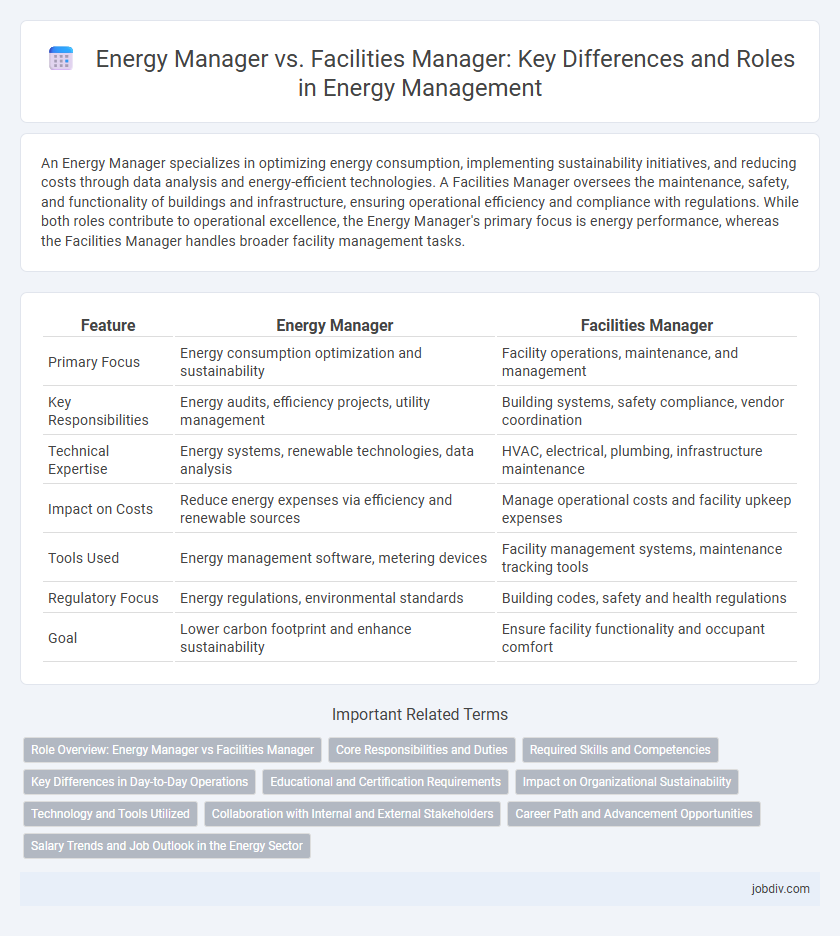An Energy Manager specializes in optimizing energy consumption, implementing sustainability initiatives, and reducing costs through data analysis and energy-efficient technologies. A Facilities Manager oversees the maintenance, safety, and functionality of buildings and infrastructure, ensuring operational efficiency and compliance with regulations. While both roles contribute to operational excellence, the Energy Manager's primary focus is energy performance, whereas the Facilities Manager handles broader facility management tasks.
Table of Comparison
| Feature | Energy Manager | Facilities Manager |
|---|---|---|
| Primary Focus | Energy consumption optimization and sustainability | Facility operations, maintenance, and management |
| Key Responsibilities | Energy audits, efficiency projects, utility management | Building systems, safety compliance, vendor coordination |
| Technical Expertise | Energy systems, renewable technologies, data analysis | HVAC, electrical, plumbing, infrastructure maintenance |
| Impact on Costs | Reduce energy expenses via efficiency and renewable sources | Manage operational costs and facility upkeep expenses |
| Tools Used | Energy management software, metering devices | Facility management systems, maintenance tracking tools |
| Regulatory Focus | Energy regulations, environmental standards | Building codes, safety and health regulations |
| Goal | Lower carbon footprint and enhance sustainability | Ensure facility functionality and occupant comfort |
Role Overview: Energy Manager vs Facilities Manager
Energy Managers specialize in optimizing energy consumption, implementing sustainable practices, and ensuring compliance with environmental regulations to reduce operational costs and carbon footprint. Facilities Managers oversee the maintenance, safety, and functionality of physical buildings and infrastructure, managing HVAC, electrical systems, and space utilization to ensure efficient facility operations. Both roles collaborate to enhance building performance, but Energy Managers concentrate on energy efficiency strategies while Facilities Managers handle day-to-day facility operations and maintenance.
Core Responsibilities and Duties
Energy Managers specialize in optimizing energy consumption, conducting audits, and implementing sustainability initiatives to reduce costs and environmental impact. Facilities Managers oversee the maintenance, operation, and security of buildings and infrastructure, ensuring efficiency, safety, and compliance with regulations. While Energy Managers focus on energy efficiency strategies and monitoring utility data, Facilities Managers handle broader operational tasks, including space management and vendor coordination.
Required Skills and Competencies
Energy Managers require expertise in energy auditing, data analysis, and sustainability strategies to optimize energy consumption and reduce costs. Facilities Managers must possess strong skills in maintenance management, HVAC systems, and regulatory compliance to ensure the efficient operation of building infrastructure. Both roles demand proficiency in project management, budgeting, and stakeholder communication, but Energy Managers prioritize technical knowledge in energy systems while Facilities Managers focus on operational oversight.
Key Differences in Day-to-Day Operations
Energy Managers focus primarily on monitoring and optimizing energy consumption using data analytics and implementing sustainable practices to reduce costs and environmental impact. Facilities Managers oversee the overall maintenance, safety, and operational efficiency of physical buildings, including HVAC systems, plumbing, and general infrastructure. While Energy Managers drive energy performance improvements, Facilities Managers ensure the facility's systems run smoothly and meet regulatory standards.
Educational and Certification Requirements
Energy Managers typically require specialized certifications such as Certified Energy Manager (CEM) or Energy Management Professional (EMP), along with a background in engineering, environmental science, or energy systems. Facilities Managers often hold credentials like Facility Management Professional (FMP) or Certified Facility Manager (CFM), with education centered on building operations, maintenance, or business management. Both roles benefit from ongoing training in sustainability practices, but Energy Managers have a stronger emphasis on energy efficiency and regulatory compliance certifications.
Impact on Organizational Sustainability
Energy Managers specialize in optimizing energy use, reducing carbon footprints, and implementing renewable energy strategies, directly enhancing organizational sustainability. Facilities Managers oversee building operations, maintenance, and space management, ensuring efficient resource use but with a broader operational scope. The targeted energy expertise of Energy Managers drives significant sustainability gains through focused energy conservation and emissions reduction initiatives.
Technology and Tools Utilized
Energy Managers utilize advanced energy management systems (EMS), smart meters, and data analytics software to monitor and optimize energy consumption, reduce costs, and improve sustainability. Facilities Managers rely on integrated building management systems (BMS), computer-aided facility management (CAFM) tools, and maintenance software to oversee physical infrastructure, ensure operational efficiency, and manage HVAC, lighting, and safety systems. Both roles leverage IoT sensors and automation technologies, but Energy Managers focus more on real-time energy usage data and predictive analytics, whereas Facilities Managers emphasize equipment maintenance and facility operations.
Collaboration with Internal and External Stakeholders
Energy Managers coordinate with internal teams such as engineering, finance, and operations to implement energy-saving initiatives while engaging external stakeholders like utility providers, regulatory agencies, and contractors to ensure compliance and optimize resource use. Facilities Managers collaborate closely with maintenance staff, leasing agents, and service vendors to maintain building operations and support energy efficiency measures. Effective communication between Energy Managers and Facilities Managers enhances project implementation, streamlines energy audits, and drives sustainable facility management practices.
Career Path and Advancement Opportunities
Energy Managers typically advance by specializing in energy efficiency, sustainability initiatives, and regulatory compliance, often moving into roles such as Sustainability Director or Chief Energy Officer. Facilities Managers progress by broadening expertise in building operations, maintenance, and vendor management, leading to positions like Director of Facilities or Operations Manager. Both career paths offer advancement opportunities, but Energy Managers benefit from the growing demand for energy-saving technologies and environmental policies, while Facilities Managers capitalize on their comprehensive understanding of physical infrastructure management.
Salary Trends and Job Outlook in the Energy Sector
Energy Managers typically command higher salaries than Facilities Managers due to specialized expertise in energy efficiency and sustainability strategies, with median pay around $80,000 to $110,000 annually compared to Facilities Managers' $60,000 to $90,000. The job outlook for Energy Managers is robust, driven by increasing global emphasis on renewable energy and regulatory compliance, projecting a faster-than-average growth rate of 7% through 2030. Facilities Managers in the energy sector maintain stable demand but face slower growth, around 3% to 4%, as their roles focus on maintaining existing infrastructure rather than spearheading energy transition initiatives.
Energy Manager vs Facilities Manager Infographic

 jobdiv.com
jobdiv.com